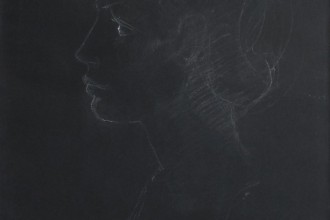He took the bundle off his shoulder and held it in one hand. With the other he moved the branches aside and entered the forest. He drew a deep breath and experienced the familiar faint smell of the trees, the same moist, heavy air. Outside the forest it was also dark but one could at least distinguish between the upright crops and the flatlands in the light of the stars. The shrubs looked like dogs sitting on their haunches and one could make out the outlines of the dark, umbrella-like crowns of the trees. But inside the forest it was so dark that one literally could not see one’s own hands. He looked up and turned his neck about to see if he could spot any stars. Everywhere there was just darkness, unending darkness. He took a few steps forward looking for stars, his head still extended upward. “Yes, there’s one.†A lone star twinkled high above. Its light flickered steadily as if it was a heart quietly beating away somewhere. “Where have its companions disappeared? Well, where else could they be except hiding behind the foliage?†Looking for other stars with his face turned skyward, he took a few more steps. With the first step this single star disappeared. He kept walking. Right between the soaring treetops, he saw two stars flickering close together. “My ‘sixth sense’ is helping me, after all. It’s brought me this far into the forest. I’ve been walking right on the trail and haven’t strayed. My feet have not forgotten the way. If I keep moving like this, I’ll soon reach my village. So why go back to that other village? How far have I come? Maybe a furlong, maybe a little more or a little less—difficult to say. There used to be a huge banyan at approximately this distance from the entrance. It stood about forty feet off the trail on the right. The forest doesn’t have any tree bigger than that one. In my youth, while gathering firewood with my friends during the day, we used to come as far as that tree and we played hide-and-seek in its thick branches. How strong and sturdy that tree used to be, like a firm majestic mountain its roots dug deep into the earth’s breast. Is it still there? I should look for it. It’s not too late; it’s only the evening.â€
He stroked the trail with his feet in order to let them become comÂpletely reacquainted and reoriented. Then he turned at a right angle, joined his feet together, and stood erect. He gauged his body’s balance, drew a deep breath, and took a step forward, as one would when measÂuring a piece of land. Extending his right arm in front of him and countÂing his steps, he started to search for the banyan. He had taken six or seven steps when his hand struck a tree. He circled around it rubbing his hand on its rough bark and then, avoiding other trees and taking each step very carefully, he walked about fifty steps. There was no sign of that magnificent tree.
The farther he moved away from the trail, the thicker the growth of trees became. His right hand swiftly scanned the space ahead of him for unexpected danger. Despite this precaution, he frequently bumped against trees and he felt as though someone had purposely given him a ruthless shove on his left shoulder. “There weren’t any trees around the banyan—were there? It used to spread its shade over a small clearing all by itself. Its aerial roots cascaded down from its stout branches like so many thick, swaying ropes. Some of these roots were sunk into the ground and looked like pillars supporting the tree’s bulky arms. My friends and I used to call it the banyan’s beard. How we used to climb up and down this beard to escape being caught by the one who was ‘It’! … If I were going in the right direction, I would have reached the banyan by now. Apparently I turned right off the trail a bit too soon. If I turn left and walk parallel to the trail I might find the banyan. I’ll look for it a bit longer. If I still don’t find it, I’ll return to the trail and head off toward my village.â€
He changed direction. The trail went straight, didn’t it? Whenever he wanted he could turn left, count sixty steps and get back to the path.
Coming back to the stump, he turned toward the trail and started walking. After counting fifty steps, he pressed his feet down to make sure. Oh, no, it was the same spongy earth where the sparse, upright strands of tall grass rustled as they rubbed against his shalwar. He now walked with great care, making sure of the ground’s firmness before taking his next step. Sixty steps later he checked the ground with his feet again, but again, no, it was not the trail. In case his feet were deceiving him, he felt the ground with his hands to be absolutely sure. It was still the same soil, still the same tall strands of grass poking into his nostrils and titillating them. “But these are the same sixty steps I had taken when I detoured from the path! So where has the trail vanished? Maybe I took a longer route on the way back. Perhaps I should go another ten or fifteen steps forward.â€




